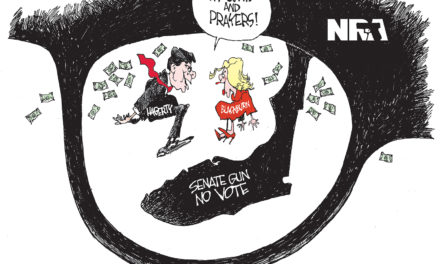Obviously, we think blogs are important.
We wouldn’t devote this much time and energy to our little corner of the digital world if we thought otherwise.
Blogs increase understanding, encourage conversation and contribute to the democratic principles. Most of all, as news organizations have cut back on their reporting staffs and have come to avoid complex coverage, bloggers often fill in the gaps.
Premature
At least that’s our view of the best of them, and we suspect that opinion is shared by the tens of millions of other people who take the time to regularly post their opinions on a range of subjects that seem to defy human imagination.
Despite this opinions, we still think that it’s too early to say that the laws that protect media reporters also apply to bloggers.
We know that journalism embraces a range of publications that run the gamut from the New York Times to the National Enquirer. As a result, it also runs the gamut of the highly respected to the gossipy, so it’s not the caliber of professionalism that becomes the basis for the legal dividing line.
We’re Not Saying
That said, there’s just too many remaining practical and legal questions to suggest that we deserve the special government protection given to journalists.
This isn’t to say that many of us aren’t just as serious about what we write or as sincere in our commitment to illuminate important issues as reporters for the mainstream media.
This isn’t to say that many of us aren’t sharing critical information about public issues.
The Reader’s Lens
It’s just to say that special government protection seems premature and imprecise.
After all, shield laws for journalists were not enacted simply because reporters are serious and informative. More to the point, they are anchored in the premise that there are shared values and special training that form the basis for reporting and editorializing.
Of course, we’re not saying that there are not some glaring exceptions, but overall, when we read a news story, all of us read them through a common lens – one based on a presumption that some general professional principles are being followed – objectivity, two sides of an issue and the pursuit of accuracy.
In addition, when we read or see a news account, we also know, or can easily determine, the organization behind it – notably, who owns it, who pays for it and who vouches for the people who write for it.
Clearing The Hurdle
It’s the lack of this general code of professional behavior that’s the biggest obstacle to bloggers being covered by shield laws for journalists.
All of this isn’t based just on the philosophical issues being debated in light of the announced investigation of a leak of a non-public Memphis Police Department document to a local blogger. It’s the practical dimensions of this issue that seem most relevant.
At a time when every teenage boy can crank up a blog to rant about his favorite subject or to degrade his latest scapegoat, it’s just hard for us to suggest that every blogger deserves legal protection? Heck, if this is the case, every one in American should sign up this afternoon on blogspot, because it is their protection for saying anything they want to say about someone else. It is the trump card for libel and defamation.
Shifting The Burden
That’s because extending shield laws to bloggers automatically shifts the legal burden to the aggrieved party to prove malice and willful disregard of the truth, a higher bar.
Of course, these days, journalists for mainstream media aren’t particularly secure in their protection any way. In recent weeks, a state judge has ordered a reporter to reveal his sources or go to jail and another court in another state has softened the shield law protection for a reporter with information investigators want.
Perhaps, bloggers may eventually deserve legal protection, but it seems to us that it would be predicated on some editorial judgment and a professional framework that guides the publishing of the information. Right now, it’s about as scientific in its definition as pornography: We’ll know it when we see it.
Two Worlds
At this point, it feels like bloggers have one foot in two worlds. On one hand, we are having conversations, while on the other side, we want to be citizen journalists. Because of this bipolar personality, bloggers often want the protection of shield laws as a journalist while they don’t want the bother of fact checking because “it’s only a blog.”
The days when bloggers were lonely commentators writing personal essays about everything from their dogs to their cities is over. Now, blogs are influential, relied on by public officials and quoted in the mainstream media. By and large, they are heavy on opinions and light on facts, reflecting a fact of life of the blogosphere itself.
One thing is inarguable: It is indeed a brave new world, and on one thing all bloggers can agree: there’s nothing quite as exciting as exploring it, because at this point, essentially anything goes, and we can make our own rules.
The 5th Estate
Because of it, it seems to us that rather than trying to fit uncomfortably as part of the Fourth Estate, perhaps the better course would be to determine how we create the boundaries, conditions and criteria for a Fifth Estate of our own.



